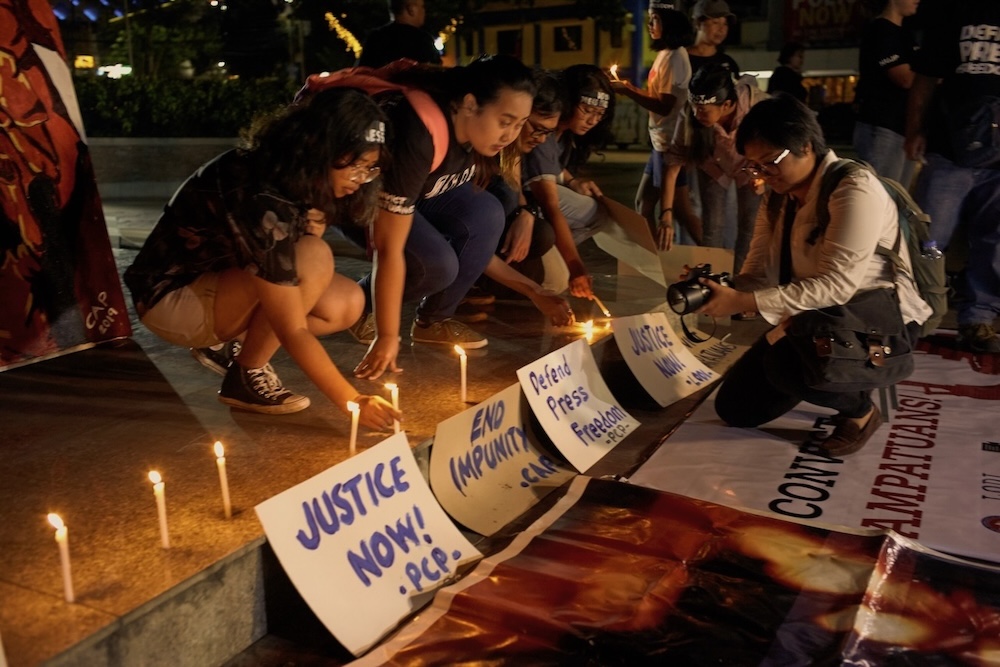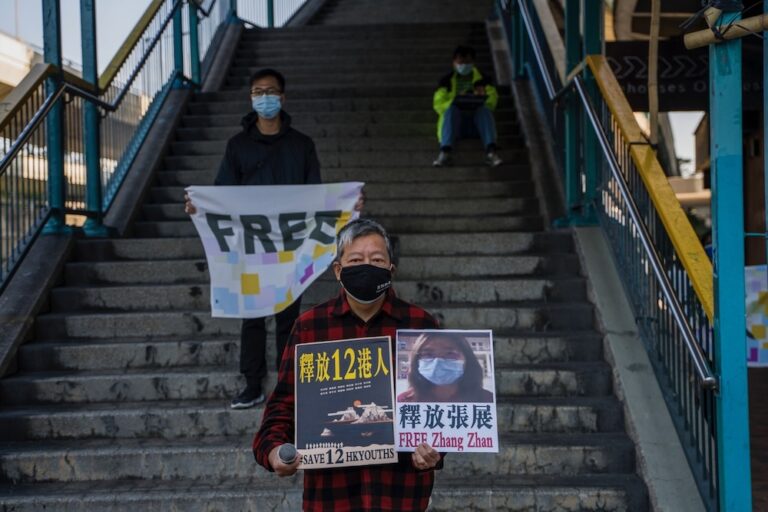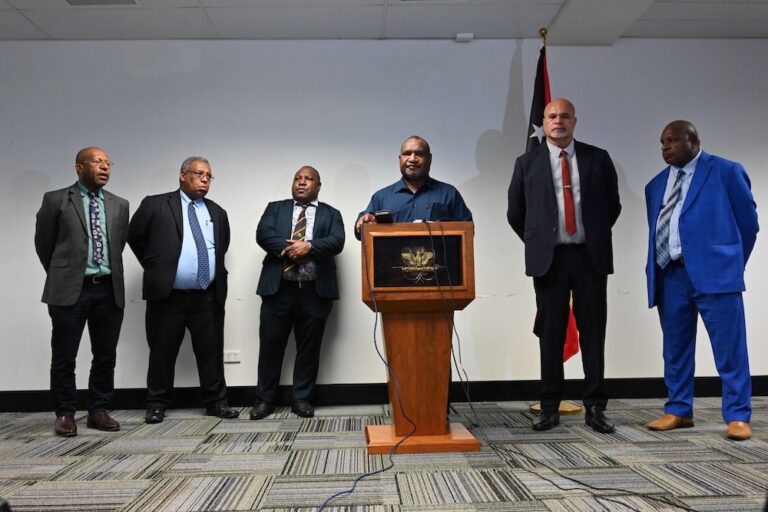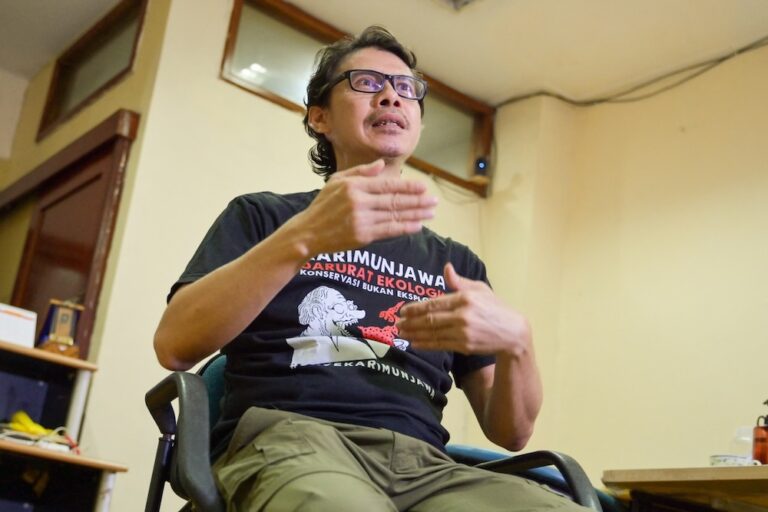November 2024 in Asia-Pacific: A free expression and civic space round-up produced by IFEX's regional editor Mong Palatino, based on IFEX member reports and news from the region.
Media groups highlight the fight against impunity, women journalists and leaders push back against harassment and injustice, Pakistan’s internet firewall, and continuing crackdown of pro-democracy forces in Hong Kong.
Culture of impunity persists
Several IFEX members across the Asia-Pacific joined rights advocates in marking the United Nation’s International Day to End Impunity for Crimes against Journalists on 2 November by highlighting the challenges faced by the media in their respective countries.
In Cambodia, civil society groups cited a report that showed 28 cases of harassment against 46 journalists in the first nine months of 2024. They expressed concern about the continuing attacks against the media.
“Targeting journalists — particularly those reporting on human rights issues — undermines freedoms of expression and the press, thereby threatening the public’s access to information. When authorities fail to investigate and punish perpetrators of crimes against journalists, it conveys the message that such offences are permissible.”
In Malaysia, civil society groups highlighted “the lack of accountability for the actions taken against journalists” and the “lack of political will to initiate constructive law reform”, which emboldened authorities to rely on colonial-era repressive laws to foster a “culture of fear” and “promote self-censorship.”
They made this recommendation to the government: “We urge that the Malaysian Media Council as an independent, multi-stakeholder self-regulatory body for the industry be established, without further delay, and be given the mandate to have the powers to protect journalists and the integrity of our media landscape.”
In Afghanistan, the media situation has further deteriorated since the Taliban’s return to power in August 2021. The Afghanistan Journalists Center (AFJC) has documented at least 447 incidents of rights violations against journalists, including three deaths, numerous threats, acts of violence, and over 220 cases of arbitrary arrests over the past three years.
“AFJC asserts that the prevailing culture of impunity, coupled with increasing threats and constraints on journalists, will have dire consequences for Afghan society and its development.”
In Pakistan, crimes against journalists have worsened this year. Pakistan Press Foundation has documented at least 117 confirmed instances of violence, intimidation, restrictive regulation, and censorship of the media, including two murders, 48 instances of assault, and 24 instances of censorship.
PPF said the situation is “a disheartening reminder of the lack of safety for journalists and the continued violence and fear that the media in Pakistan has to work within.” It added that “it is unacceptable that over the years, despite changes in government and claims of support for journalists by different political parties, journalists in Pakistan continue to face direct risks for their work.”
Digital Rights Foundation has posted a thread on X (Twitter) outlining key reforms needed to strengthen legal protection for journalists.
In the Philippines, Free Press Unlimited (FPU), the Committee to Protect Journalists (CPJ), and Reporters Without Borders (RSF) – who together form the ‘A Safer World for the Truth’ initiative – urged authorities to pursue justice for the 2011 murder of broadcast journalist Gerry Ortega, whose case has become “emblematic of the entrenched impunity in media killings” in the country. The press freedom watchdogs reiterated their call for a swift trial after the suspected mastermind, who has evaded justice in the last 13 years, was finally apprehended this year.
The month of November is also the anniversary of the 2009 Ampatuan Massacre, when 58 people, including 32 journalists, were killed. The Center for Media Freedom and Responsibility said the case and the unabated media killings underscore the need for vigilance.
“The nearly ten-year wait for a decision in the 2009 Ampatuan Massacre was a betrayal of justice in itself. This case reflects the culture of impunity in the Philippines, where perpetrators remain unpunished, and justice remains more elusive than ever.”
In Australia, members of the Media, Entertainment and Arts Alliance (MEAA) held a vigil in Brisbane to condemn media killings in different parts of the world, especially in Palestine. MEAA Federal President Michael Balk delivered a speech during the event.
“Powerful forces often seek to suppress the truth by intimidating, bullying, harassing or using violence against journalists. Sometimes journalists are deliberately killed just for doing their jobs.”
Women standing up for truth and justice
Indian investigative journalist and Washington Post columnist Rana Ayyub has filed a police report against a right-wing influencer who targeted her with a doxxing operation in November.
“I have lived a nightmare,” she wrote on X (Twitter) after her personal numbers and passwords were leaked online.
“How do you shame and silence a woman who refuses to give in. You try to assault her character, try to outrage her modesty, make her fearful of operating her social media accounts, share rumors about her morality and the myth that she sleeps around to get her stories, the oldest stereotype in the book,” she posted on her Instagram account. The perpetrator of the intensified online harassment is a known affiliate of the ruling party of India. Rana Ayyub has remained defiant.
“I ain’t going anywhere. Thank you for making me realise that my work is making an impact, that my words scare you, that my existence challenges your cowardice and hate.”
Rana Ayyub, who faced backlash for her critical coverage on the Modi government, received a 2024 International Press Freedom Award from the Canadian Journalists for Free Expression “for her reporting that holds governments to account while staunchly defending press freedom.”
In Palau, newspaper Island Times was sued for “negligence and defamation” after it reported the leaked tax documents of Surangel and Sons, a company owned by the father of the country’s president. The Pacific Freedom Forum has warned that the lawsuit “threatens public trust in media and private sector transparency.” Leilani Reklai, the newspaper publisher, has vowed to defend the work of media.
“If I don’t stand up to this, it sends a signal to all journalists here that they risk facing claims for damages from powerful companies and government officials while carrying out their work.”
In the Philippines, community journalist Frenchie Mae Cumpio took the witness stand on 11 November after four years of being detained for alleged illegal possession of firearms and explosives, aside from facing the charge for terrorism financing. RSF noted that Cumpio, who reported on abuses committed by the military, “is targeted by a strategy that seeks to deter all Filipino journalists from investigating taboo topics.”
In New Zealand, more than 10,000 people joined a hikoi (peaceful march) to protest the introduction of the controversial Treaty Principles Bill in Parliament. Critics said the bill, if passed, could reverse the rights and other protection mechanisms for the Indigenous Māori people. While the hikoi gathered a massive crowd in the streets, a haka (traditional war dance) was staged by Māori legislators inside Parliament, led by the country’s youngest parliamentarian, Hana-Rawhiti Maipi-Clarke. In an interview with The Morning Shift podcast, Hana-Rawhiti Maipi-Clarke commented on the haka video – which went viral around the world – and her inspiration for the protest. “It was bound to happen and, again… it wasn’t even about me. It was about those 500 ancestors who signed that Treaty and they were like, ‘nah, that’s enough’.”
Pakistan’s internet firewall
Access to internet services remains disrupted in Pakistan as authorities impose stricter regulations on Virtual Private Networks (VPNs) as part of the government’s security measures to counter threats of terrorism.
Protests surged after the divisive February election, which led to the banning of X (Twitter) and has remained inaccessible up to this day. The decline in the quality of online connectivity in July was attributed to the installation of a national firewall intended to prohibit “harmful” content, although officials claimed it was due to the sudden rise in VPN usage.
Recently, the government has required the registration of VPNs, while the powerful Council of Islamic Ideology has declared illegal VPNs as “un-Islamic”. IFEX member Bytes for All has warned against the disproportionate crackdown on VPNs:
“We believe that labeling VPN use as un-Islamic is a misleading narrative that misrepresents the utility of these products and risks distancing millions of Pakistani citizens who rely on them for personal and professional protection […] We advise the government to reconsider its plans to ban VPNs and draw a balance between fundamental freedoms and counter-terrorism measures.”
Meanwhile, PPF reminded authorities about the dire impact of internet disruption, especially during emergency situations. “In a period of political upheaval, it is even more important for citizens, particularly in cities where protests are taking place, to remain updated about developments,” PPF said after WhatsApp and Instagram became unavailable in November in cities where the opposition has organised protests.
Hong Kong: Continuing persecution of pro-democracy voices
A Hong Kong court handed out long prison sentences to 45 pro-democracy figures convicted of “conspiracy to commit subversion” for their role in organising an informal primary election in 2020.
Human Rights Watch said that the harsh ruling reflects “how fast Hong Kong’s civil liberties and the rule of law have nosedived in the four years since the Chinese government imposed the draconian National Security Law on the city.”
Former Stand News journalist Gwyneth Ho, who was among those convicted, asserted the justness of their actions.
“Our true crime for Beijing is that we were not content with playing along in manipulated elections. We organized ourselves to rise above partisan fragmentation, came together, and attempted to break through. We dared to reach for actual power to hold the government accountable.”
Meanwhile, media tycoon Jimmy Lai took the witness stand after four years in detention for alleged violation of the National Security Law. In an interview with CPJ, Sebastien Lai said that his father was placed under solitary confinement, which could gravely affect the health of the 77-year-old publisher.
“My father is a strong person, but the Hong Kong government has spent four years trying to break him. I don’t think they can break his spirit but with his treatment they are in the process of breaking his body.”



